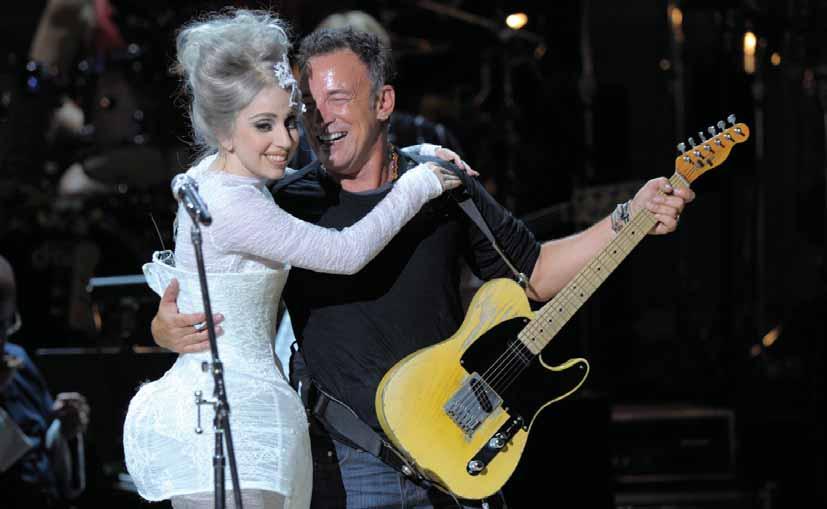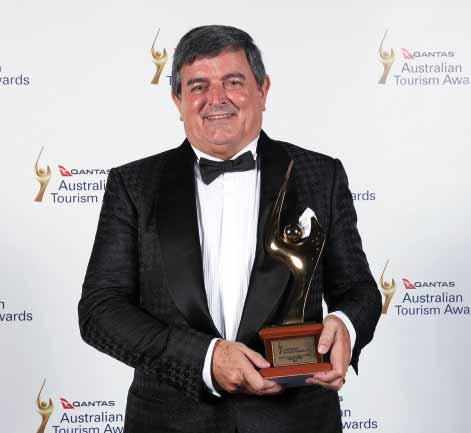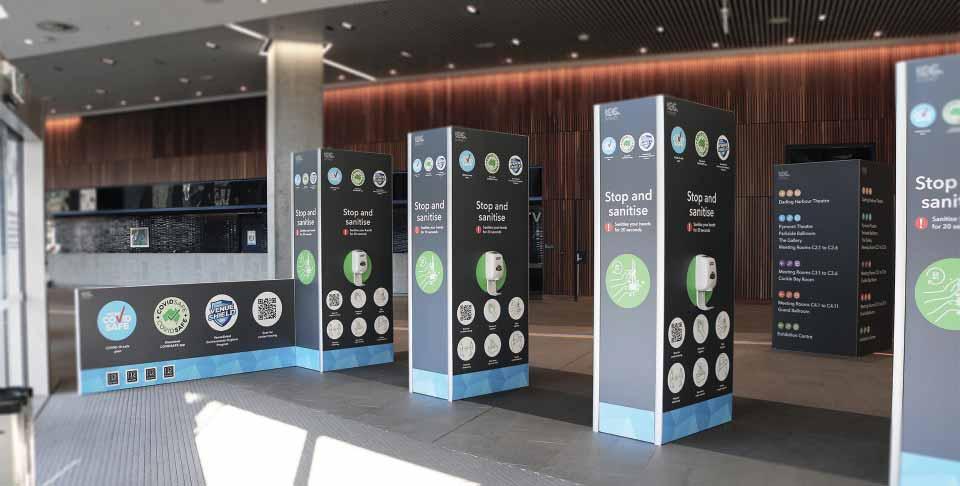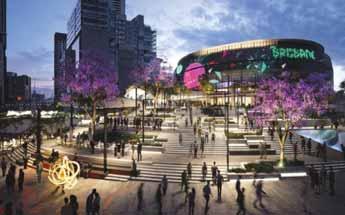
15 minute read
Ready to Entertain Again
Harvey Lister feels that every live event “has the potential to deliver something truly extraordinary”.
Recognised for lifetime career achievements, ASM Global’s Harvey Lister explains his ongoing commitment to the live experience
Advertisement
When he was presented with the Lifetime Achievement Award at the 2020 Australian Event Awards, Harvey Lister stated “former heavyweight boxing champion Mike Tyson is quoted as saying ‘everybody has a plan - until they get punched in the face’. A punch can happen in very many ways in this industry and it’s about adapting and working with great teams to make the most of any situation.”
Speaking to Australasian Leisure Management about the ‘Coronavirus punch’, Lister explained “this has clearly been one of those one in a hundred year events, that no company factored into their forward projections or their cashflow budgeting.”
As for how abruptly ASM Global’s operations came to a halt, Lister recalls “I was in Los Angeles for the Grammy Awards that our company produces at the AEG Staples Center on what was the Australia Day weekend and we were hearing about the emergence of another virus and so Bob Newman, the Chief Executive of ASM Global, called together the global senior leadership team.
“It was a mammoth weekend given that Kobe Bryant had been killed in a helicopter accident and he was an LA Lakers player who a lot of the ASM management had known.
“It was also a huge emotional weekend for the company, and then this … we started planning for what could happen, right back then.
“By the time I came back to Australia later that week, we were starting to see the first shoots of it potentially affecting our market.

Harvey Lister receives the Australian Tourism Legend Award.
“And I was fortunate enough to be able to sit on a global leadership call every morning all the way through until October when we wound that back to once a week.”
Through these Zoom calls, Lister notes “we were hearing in real time what was happening in every region of the world and how people were reacting to that. We had our government
owners, the venues we operate around the world, asking us ‘well what comes next?’
“It was a wild ride but enormously satisfying that we have been able to get ahead of the game and to know that every venue in the region will come back eventually into business.
“To achieve this we invested a significant amount of money in bringing together a response that all of our venues, globally, could adopt.”
Venue Shield, a series of industry-leading protocols, provides trusted protection for the live experience as facilities across the globe begin to reopen and welcome staff, tenants and guests.
Lister advises “we have deployed Venue Shield in more than 350 venues globally - providing for the local conditions and local government requirements in each country, state and/or region.
“It gave us great comfort that we were able to provide that type of resource, the first in our industry. But even more pleasing than that was, we put together a team of a hundred of ASM Global’s smartest people - including 11 of our people from our Asia-Pacific region - to deliver it.
“We divided these people - the real brains in our organisation, our front line operations people with experience across every sector of the business - up into seven different working groups and they were doing Zoom calls every day. They put the Venue Shield guide together, bringing in international expertise, medical universities, including risk consultants here in Australia and others that allowed us, by June, to be working differently and be well placed to be among the first venues to start coming back.
“Suncorp Stadium in Brisbane was one of the first, with our General Manager at Suncorp Stadium, Alan Graham, having been part of the Venue Shield team.
“The event plan that he and his team at Suncorp Stadium put together enabled us to start accommodating fans again, at Brisbane Broncos games initially, was so impressive that it was adopted by the company in every other region of the world.
“For them to start to come back into business, at events that even included some of the presidential rallies that were happening in the USA, was based on the event plan that Alan and his team brought together and which still forms the basis of our international event plans today.”
Lister also feels that the coming together of the Live Entertainment Industry Forum (LEIF) has been significant, noting that “in my 45 odd years in this business this is the first time that anything like that had been done.
“I have never seen the industry come together so positively before and inviting in representative organisations like Live Performance Australia, the Venue Management Association, the Australian Festivals Association has created a positive mood to see if we can find some common ground on planning for a post COVID-19 live industry.
“It’s also been interesting how LEIF has been very practical, and worked cooperatively with governments to seek help as appropriate while some bodies have been far more combatative in taking on governments.
“As venue operators we have enjoyed a terrific relationship with other venue operators, including the government-operated venues, for many years and have often taken a collaborative approach to industry issues that have come up from time to time.
“We are fortunate in the venue world to have a lot of very experienced ‘adults’ as operators of venues and we consider their communities before we consider our own P&L.
“So I don’t think it was open to us as venue operators to be out there wanting to kick the various governments, as some other sectors did.
“And especially because of that, we go to understand what everybody was dealing with and we understand that we have a commitment to the communities who have entrusted us with

ASM Global has deployed Venue Shield in more than 350 of its venues around the world.
the management of their ‘crown jewels’ in these major facilities and that is up to us to work with them.
“I must also note that the major concert promoters, who are vigorous competitors with each other, all contributed resources, came together and realised everybody simply had to be on the same page. This wasn’t about seeing who could grab which concert tour, this was about coming up with a properly planned industry response.
“The Australian marketplace has a flood of international talent just waiting to come and re-engage with this country because of the way that our governments have dealt with suppressing the virus so far.
Over the past 45 years Harvey Lister, APAC Chairman and Chief Executive of ASM Global (Asia Pacific), has been involved in the presentation of over 40,000 major events including multiple Olympic and Paralympic Games, Commonwealth Games, Invictus Games, Goodwill Games, South East Asia Games, World Title boxing matches, Commonwealth Heads of Government meetings, G20 meetings, World Expos, World Cup Rugby League, World Cup Rugby, rugby league and rugby union international Tests, Asian Cup Football, Test Cricket, One Day and 20/20 Cricket, AFL, football, basketball and netball internationals, major tennis tournaments, and thousands of global and national conferences, major indoor and outdoor concerts, family events, exhibitions, and touring spectaculars.
Lister and his business partners have been involved in the presentation and management of events spanning all forms of sport, the arts, conventions and exhibitions, concerts and general entertainment and has a wealth of knowledge and practical experience in the design and operation of major public assembly facilities, the events they host, and of the tourism and leisure industries generally.
Following the 2019 merger of AEG Facilities and SMG, two of the world’s leading venue management and services companies, Lister became Chief Executive of ASM Global (Asia Pacific), responsible for overseeing ASM Global’s portfolio of business activities in Australia, New Zealand, India, South East Asia and the Middle East.
In October last year he received the Australian Event Awards Lifetime Achievement Award.
In 2017, he was presented with the Australian Tourism Legend Award at the Qantas Australian Tourism Awards.

COVIDSafe protocols in place at ICC Sydney (above) and at Brisbane’s Suncorp Stadium (below).
“There is a lot of confidence that we will be able to come screaming out of the blocks in late 2021, starting with strong touring line-ups of Australian talent and, when borders open, international talent.
“I think a full revival will be more likely in Q1 and Q2 in 2022 when we’ll be back to the types of attendance numbers that we were seeing before the Coronavirus.
“We think we will be back to the numbers of 2019, which for our company was our strongest year ever, in 2022 and 2023.”
In dealing with the challenges of Coronavirus, Lister acknowledges that “JobKeeper has been a godsend for our industry and I think it’s done precisely what the Federal Government wanted it to do and that is to keep the employees engaged with their employers.
“Of course, we also have 5500 casual employees in this country alone and these are the legitimate gig economy employees.
“So food and beverage, front-of-house, car parking operations, technical support services, cleaning, and security employees got to nominate which employer they wanted to remain engaged with and a large number of them nominated us because we have provided the most average shifts for them.
“I think it’s a reality that some of those people probably are earning more through JobKeeper than they actually earn working in our industry, based on their average shifts.
“In our view it was a good program by the Federal Government to keep circulating money within the economy but we haven’t really seen those monies circulating with any great velocity.
“In saying that I mean the downstream economic impact of somebody receiving a JobKeeper payment and spending it in the marketplace - that being multiplied over and over and over again it transitions through the marketplace, through the manufacturing sector, to raw materials and then back out to wages on the other end.
“So, in an economic sense I don’t think we are seeing that yet and with the Federal Government looking at wanting to end JobKeeper in March, I think that is enormously significant as in our industry it has been really legitimately applied, because these are people who couldn’t work because of government enforced shutdowns of our industry.
“I think that’s very concerning and I do worry, in fact it’s one of the few things that keeps me awake at night, in thinking of those employees and what do they do until the industry does come back into full force … and that is still going to be a little way away.”
At the same time, Lister is noticing some business sectors having trouble getting staff, noting that during lockdown “casual staff, some of whom have worked for us for well in excess of 20 years have had to move on to other casual work because there were other industries that were thriving during the COVID-19 period.
“Some of those people have moved on so we have faced challenges in getting the number of employees that we need, particularly in the food and beverage area, for big events.
“When the event industry is busy or when a major event is in the city - such as the Bledisloe Cup or the third State of Origin matches which we hosted - when the city stadium or convention centre or arena is busy, so is the rest of the city.
“Therefore all these locations are looking for casual workers to do shifts to meet the pre and post event demand. And so that just adds to that challenge.”
Mindful of reports that suggest different patterns of consumer behaviour and particularly the growth of in-home entertainment during lockdowns, Lister emphasises “live events aren’t going anywhere”, going on to point to the example that “people have suggested that streaming was the end of live music and that everybody will just sit in their lounge room and be able to listen to things much cheaper than going and seeing an act live.
“I look to our young people. They are in the most exciting business, they have chosen to work in the most exciting business in the world.
“And for consumers, every event they go to that’s live, has the potential to deliver something truly extraordinary.


The concept for Brisbane Live.
“I think of Bruce Springsteen grabbing Lady Gaga from the front row and taking her up on the stage and the pair of them doing knee slides across the stage with Bruce playing guitar; the Global Physics Conference session where the Dutch professor announced that overnight he and his associates had discovered the long sought after ‘God Particle’; or seeing that pass from Wally Lewis or that kick from Tony Lockett.
“They’re truly the things that make live entertainment, live sport and live events, a must.
“I don’t believe that is ever going out of business and also don’t see that hybrid events are going to kill the meetings business.
“We don’t conform to that view at all. We do think that it has been very effective being able to run hybrid events during the periods of lockdown and had actually been using hybrid elements as part of the conference experience for some time.
“Here we found that about 40% of the people who attend a conference event or session remotely are indicating that next year they would like to attend that event in person.
“So we expect that more conference events will be broadcast, will be streamed and made available to a much broader group of people with these events becoming a new form of income for conference and exhibition organisers as it’s going to allow them to be able to invite the world in when they do their event.”
In terms of infrastructure, Lister is confident that governments around the world will continue to inject capital into facilities, pointing out that “they are looking for shovel ready projects, facilities that will be built and operational within three to four years.
“We think over the next few years we will see significant upgrades to existing venues and new facilities in many places and across Asia, into the Middle-East and in India we see enormous opportunities for us as a business.
“We are just now waiting for some of those decisions to be taken once everybody gets some more certainty about how vaccines will work.
“So, we are very positive. I think we will operate our venues a little differently in the future, as we’ve had to do when terrorist incidents in other parts of the world caused us to rethink things. With COVID-19 we will have done the same thing.”
As for ASM Global (Asia Pacific)’s own major infrastructure plan, the Brisbane Live - a $2 billion redevelopment at the Roma Street railyards in Brisbane’s CBD that will create a world class entertainment precinct - Lister advises “I’m very confident that Brisbane Live is going to happen.
“The Queensland Government has agreed the delivery of the Cross River Rail project, has their plans complete and the two massive tunnel boring machines are now starting work. Government can now start planning how the above-ground entertainment precinct will look.
“I think work on Brisbane Live could start around the end of 2023, or early 2024, which is sort of within the timelines of what we have always thought would be the timeline for the delivery of the project.”
Looking back on his career, Lister stated “it’s been an honour to have the opportunity to live through the growth of this industry from very raw beginnings in the 1970s when there were few rules and very little precedent.
“The professionalism of the industry as it has grown has been the major change over time. When we started in the industry we effectively made it up as we went along but today we’re blessed with great operating systems and outstanding people.”
Advising that developing trust with key stakeholders, including government, was central to his longevity in events management, he also said that preparation was vital to the success of events.
Lister noted “event management is trying to prepare for all of the things that could be a possibility for your event knowing all along that something you had never thought about could happen.”
Lister points to some examples from his career, which began when he organised a series of ‘Rock-a-rama’ concerts that sold out suburban town halls in Brisbane and south east Queensland in 1972 and 1973.
He recalled a power blackout mid-show during a Bette Midler concert at Brisbane’s Festival Hall during which the superstar used the torches of ushers to cast light on her while she performed acapella until the power returned.
He remembers the innovation of Tina Turner who went to the staff uniform cupboard of her Brisbane hotel to fashion costumes for a concert after her tour truck did not arrive.
And he is thankful to global star Andre Rieu who played an impromptu set while thousands returned to their seats after a hailstorm forced them to scurry from an outdoor concert into the protective tunnels of the stadium.
With COVID-19 having thrown a new variable into the industry, Lister said that preparations were underway for a resumption of shows once the health threat had been minimised.
He added “we’re always learning and we’re constantly aided by major upgrades in technology and the entry of more and more outstanding young workers in this industry.”

A COVID-19 Safety Marshall at ICC Sydney.
SMG & AEG FACILITIES ARE NOW ASM GLOBAL











